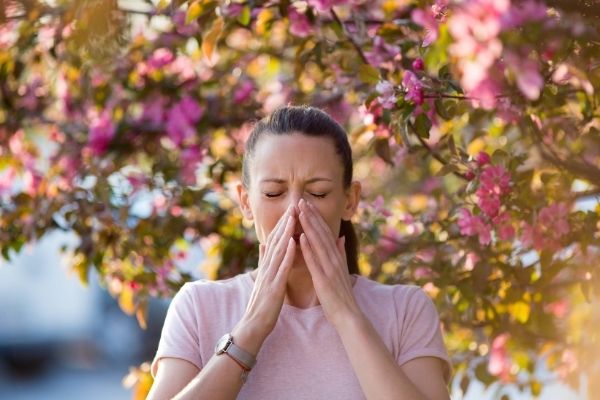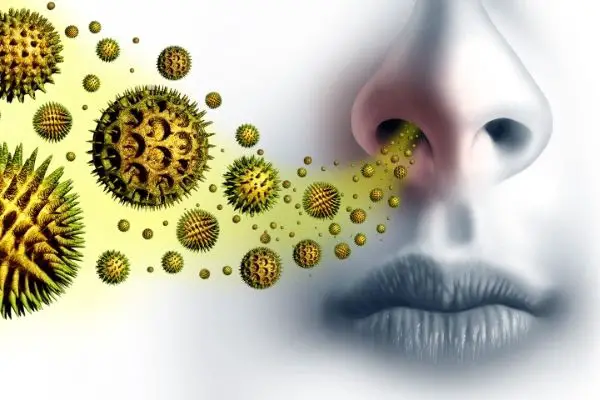Acne is an annoying skin condition that makes an appearance at different points in a person’s life. If you are lucky, you won’t have to deal with many breakouts after puberty. However, many of us still have to battle acne during adulthood as well. For example, acne is known to occur during pregnancy, menstruation, menopause, and other periods.
The combination of excess oil production, dead skin cells, poor gut health, and bacteria are the known acne causes. However, your breakout can also be a result of other contributory sources. Here, in this article, we will try to understand whether acne can be caused by allergies.
Can Acne Be Caused By Allergies?
Allergies occur when the immune system of a person reacts to a substance in a way that is normally not seen in other people. The immune system produces antibodies that identify a harmless or sometimes even well-meaning foreign substance as offensive. As a result, when the person comes in contact with a foreign substance, a fight ensues. During the conflict, you might notice swellings, inflammations, itchy skin, and more.
Allergies do not cause acne directly. However, allergies and food sensitivities can indirectly contribute to an acne breakout. There is currently no evidence that allergies can cause acne. However, when you are allergic to a substance, the body often overreacts and produces antibodies to attack the substance.
When this happens, it can cause a lot of itchiness, sneezing, red skin, and watery eyes. By implication, you will be tempted to do a lot of rubbing, scratching, and wiping to remove moisture and make the skin feel better.
Unfortunately, all the rubbing and itching can irritate the skin and aggravate an existing acne breakout. Not just this, excessively rubbing the skin can dry it. When the skin is dry, it prompts the system to produce more oil to compensate for the loss.
Excess oil thus produced can clog the pores. Apart from this, it is very difficult to leave an acne site untouched when you experience an allergic reaction. Touching and scraping your skin is not a hygienic thing to do, it would only irritate it and cause a more decisive body response. It might even cause us to spread the bacteria to healthy parts of the skin.
Apart from this, allergies often interact with your gut health and contribute to acne. The gut is a line of defense between general circulation and the digestive tract interior. It separates the intestinal tract from other systems.
When an allergic reaction irritates your gut’s lining, it can cause it to be inflamed. When this occurs, the digestive nerves alert the body to the presence of war. Gut inflammation and irritation can affect the tight barrier, and make it impossible to keep bacteria, toxins, and unwanted contents out of your system.
When harmful microorganisms and bacteria enter with food proteins, it negatively affects the immune system and causes leaky skin. A leaky skin or leaky gut means that the intestinal walls’ tight junctures are now wide; hence, undigested food particles can seep through into the bloodstream. Since your body will naturally try to fight the strangers, it causes systemic inflammation.
As expected, this is not the root cause of acne; however, more inflammation and a weakened immune system won’t help the fight against acne. Hence, although allergies don’t cause acne, they can contribute to an acne breakout.
Seasonal Allergies And Acne

Seasonal allergies and changing weather can contribute to acne too. The reason for this is because most people who have seasonal allergies have dry, irritated, and itchy skin. Exposure to allergens in the air can also cause allergic skin rashes.
In reaction to the allergens, the body reacts with scaly patches, eczema, and hives. Unfortunately, the reactions are painful and cause you to scratch and damage your skin.
Allergens like pollen and dust, when you breathe them in, cause the immune system to produce antibodies that stimulate certain chemicals into the bloodstream. Histamines, for example, causes the skin to be more sensitive and can cause irritation, redness, and itching.
Apart from this, people with allergic contact dermatitis risk more breakout since the skin is always in a constant state of irritation. When the skin cells are shed, some find their way back to the pores and clog them to cause acne. However, since the skin is irritated, the clogs can quickly progress into red pimples caused by bacteria infection and allergic inflammation.
Even if there are no bacteria, the spots on the skin will appear red. Different substances are responsible for allergic contact dermatitis; hence, avoiding them is the best way to prevent such effects.
Combine the factors of irritation, inflammation, and dry skin, and you will have enough contributory factors that can make your acne breakout worse. However, since it is seasonal, you won’t have much problem with it off-season.
Food Allergies And Acne

On the surface, food allergies are simply the body mistaking a harmless food as something that can make you sick. As a result, your immune system reacts to protect you. Since almost any food can trigger an allergy, it can be hard to tie mild symptoms to a particular food. The common reactions include red, swollen, and itchy or dry skin rash. It can also cause red, watery, or itchy eyes.
No doubt, reactions to foods and specific ingredients can also contribute to acne. Inflammation and swelling are prominent allergy symptoms. Since acne can be another form of inflammation, having one can lead to the other.
If you notice bumps appearing on your face after eating a particular food, the best guess is that you have a food allergy. Other symptoms include abdominal pain, difficult breathing, hives, swelling, etc.
For example, gluten is a group of proteins naturally found in grains like wheat, rye, barley, and triticale. Since it is elastic, gluten acts like a glue that holds foods together. Although well-meaning, a reaction against it or gluten sensitivity can contribute to your breakout.
Other food concerns that can aggravate acne include dairy products, eggs, nuts, wheat, fish, soy, etc.
The most effective way to avoid food allergy and resulting inflammation are to avoid the food or ingredient that caused it. However, the ingredients are not always easy to detect since the labels are not always truthful. In this case, you can consult an allergist for a diagnosis and recommendations.
Acne And Allergic Reaction To Acne Products
Some over-the-counter acne products can cause irritation and allergic reaction that can contribute to an acne breakout.
For example, products containing active ingredients like salicylic acid and benzoyl peroxide can irritate certain skin types when applied to the skin. Since they are available as face washes, gels, lotions, and toners, it is considerably easy to pick an allergy from any readily available products.
The allergic reaction caused by the products differ in severity; however, the common ones include swelling, itching, burning, redness, dryness, and peeling. On its own, symptoms from normal product use include dry skin, minor peeling, and moderate redness. However, it stops being normal when any of the side effects or symptoms are severe or serious.
Either way, the symptoms irritate the skin and puts it under undue pressure. Until you stop using the offending product or ingredients, the symptoms will only get worse.
Needless to say, severe itching of the skin, severe skin irritation, severe redness, crusting of the skin, peeling, and more will strain the skin. The narrative will be worse if any of the symptoms occur with a mild acne breakout. In this case, it can potentially transform mild acne into a severe one.
You should stop the product immediately when you notice any of the effects and speak to an allergist for solutions.
Environmental Allergies And Acne
Environmental pollution can lead to allergies that can spiral into acne. For example, air pollution, smog, and breathing in air pollutants build-up can lead to acne. The reason is that pollution weakens the skin’s immune system.
As a result, it won’t be able to fight free radicals to keep the skin clean. When you absorb dirty air, it automatically makes your skin dirty. The combination of debris, dust, and dirt can collect on the skin and block the pores. Apart from this, it exposes you to free radicals that can cause inflammations.
The body uses the lungs, sweating, urinary tracts, and colon to eliminate toxins. However, when it is not able to do this, it can cause rashes or skin sensitivity. Since you can’t go about covering your entire body, the best care is to use protective products like vitamin C, etc. Products like these will serve as an antioxidant barrier to neutralize free radicals to prevent them from inflaming the cells on entering the bloodstream.
What Does Allergy Acne Look Like?
There are different types of acne, but the most common ones are whiteheads, blackheads, papules, pustules, nodules, and cysts.
Acne can be mild with only a few blemishes or severe with numerous inflamed pimples. Allergy acne is mostly characterized by red bumps on the face that are filled with pus. The bumps can be small or large and painful.
Allergy acne is different from regular acne because it is not caused by bacteria. It is usually triggered by an allergen like pollen, dust mites, etc. that comes into contact with the skin. When this happens, the immune system reacts to the allergen by releasing histamines. The histamines cause inflammation, redness, and swelling.
How Long Does Allergy Acne Last?
Hives and other allergic reactions usually go away on their own within a few days. However, if the symptoms are severe, you may need medication.
Acne caused by allergies can last for weeks or even months. It all depends on the type of allergen and how sensitive your skin is to it. If you have seasonal allergies, your acne may go away when the season changes.
On the other hand, if you’re allergic to a skincare product, you will only get rid of the allergy acne when you stop using the product.
Preventing Allergy Related Acne
Hives and other skin reactions can be prevented by avoiding the things that you’re allergic to. However, this may not always be possible, especially if you have seasonal allergies.
The best thing that you can do is to use products that contain natural ingredients. You should also avoid using harsh chemicals on your skin. If you must use them, make sure to do a patch test first.
A patch test is when you apply a small amount of the product on a small area of skin and wait to see if there will be any reaction. If there is no reaction after 24 hours, it is safe to use the product.
You should also visit an allergist to get tested for allergies. This way, you will know exactly what you are allergic to.
Here are some other things you can do –
- When the pollen count is high, stay indoors.
- Wear a face mask when you’re outside.
- Wash your face before going to bed.
- Wash sheets and pillowcases in hot water to get rid of dust mites.
- Remove carpets from your home.
- Stay hydrated by drinking plenty of water.
- Reduce stress levels.
- Use a humidifier to add moisture to the air.
- Use a vitamin C based facial serum to help protect your skin from free radicals.
How To Treat Allergy Acne?
More than 50 million Americans suffer from an allergy each year, according to the Asthma and Allergy Foundation of America.
If you think your acne flare-ups are caused by allergies, follow these steps:
Stick to a Regular Skin Care Regimen
If you have allergy acne, you should still follow a regular skin care routine. This means cleansing, toning, and moisturizing your face every day.
You may also need to use other products like spot treatments, exfoliants, etc. depending on the severity of your acne. Just make sure to choose hypoallergenic and non-comedogenic products that won’t clog your pores.
Identify Your Allergens
The first step is to identify your allergens. If you can pinpoint what’s causing your allergy acne, it will be easier to avoid them.
Common allergens include dust mites, pollen, pet dander, cosmetics, fragrances, certain foods, etc.
Avoid Contact with Your Allergens
The best way to avoid contact with your allergens is to stay inside as much as possible when the pollen count is high.
You can also wear a face mask when you’re outside and keep your windows closed. If you have pets, keep them out of the bedroom and keep your house clean.
Limit Your Exposure to Pollution
Pollution can also trigger allergies and acne. Try to limit your exposure to pollution as much as possible by avoiding busy streets and using air filters in your home and car.
Test Your Skincare Products
Trying to figure out if your skincare products are causing your allergy acne?
The best way to do this is to do a patch test.
To do a patch test, apply a small amount of the product on a small area of skin and wait 24 hours. If you don’t see any reaction, it’s probably safe to use the product.
If you start seeing redness, swelling, or bumps, wash the area with water and stop using the product.
Use Gentle Skincare Products
Sensitive skin can also be prone to allergies. If you have sensitive skin, try using gentle skincare products that are free of harsh chemicals and fragrances.
Look for skincare products that are labeled “hypoallergenic” and “fragrance-free.”
See an Allergist
If your allergy acne is severe and nothing seems to be working, it’s time to see an allergist. They can help you identify your allergens and find the best treatment for your condition.
Take Medication if Necessary
If your allergy acne is severe, you may need medication like antihistamines or corticosteroids. Talk to your doctor about which medications are right for you.
You should also see a doctor if your acne is not responding to home treatment or if it’s causing you anxiety or depression.
So, Can Acne Be Caused By Allergies?
Allergies that can damage the skin barrier function or cause acne-like effects can contribute to an acne breakout. Although it is not always the case, it is advisable to stay away from the offending product or ingredients when you detect its manifestation.
Since allergies can be picked from any and different sources, it will help to speak to an allergist about what to expect and how to distinguish between an allergy and the body doing its thing.

